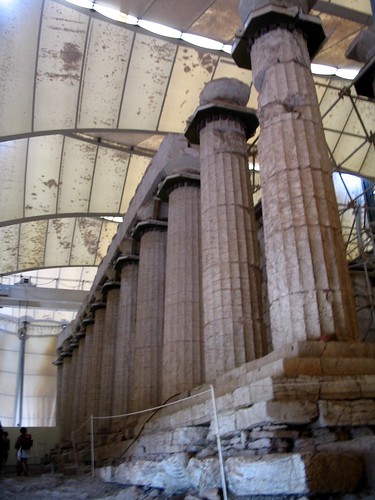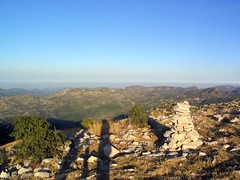The temple, as noted by Beard and Henderson, and in Meadows' quotation, "is now entirely shored up and covered by a tent (the restoration and consolidation works continue), because [of] its critical state":

Unfortunately, this unsightly tent, designed to preserve the temple from the ravages of pollution (and, wicked witch-like, rain), does a better job trapping pollution inside so it can really have a go at the limestone. It does, however, make for easier sighting from the ash altar atop Mt. Lykaion...

...which gets a mention in Classics: "High on a mountainside in a rugged and lonely part of Arcadia stands a remote shrine to Zeus Lykaios, Wolf Zeus" (C. Segal, Tragedy and Civilisation 1981, 1, quoted in Beard and Henderson, 89-90)... "grim precinct... the mountain where a grisly and primitive cult violated one of the first laws of human civilization as the Greeks defined it, the taboo against cannibalism" (B&H, 96).
The early excavations at Mt. Lykaion found no evidence of human sacrifice, and the past season of work at the altar, despite the careful attention of a renowned physical anthropologist, also produced no human remains. Madeleine Jost ("À propos des sacrifices humains dans le sanctuaire de Zeus du mont Lycée." In Robin Hägg (ed.), Peloponnesian Sanctuaries and Cults: Proceedings of the Ninth International Symposium at the Swedish Institute at Athens, 11-13 June 1994, pp. 183-6) has suggested that if there were human sacrifices, the victims may not have been mixed with the animal remains on the altar. That said, I believe Plato's Republic (565 d-e) is the earliest written reference to human sacrifice at Mt. Lykaion, and that account does not inspire particular confidence:
"'What, then, is the starting-point of the transformation of a protector into a tyrant? Is it not obviously when the protector's acts begin to reproduce the legend that is told of the shrine of Lykaion Zeus in Arcadia?' 'What is that?' he said. 'The story goes that he who tastes of the one bit of human entrails minced up with those of other victims is inevitably transformed into a wolf. Have you not heard the tale?'"
The connection of Mt. Lykaion with lycanthropy is a common one (see, e.g., Segal above, or the latest issue of Archaeology), and dates back at least as far as Plato. It is, however, etymologically false. The Greek epithet lukai~os derives not from lu/kos "wolf" but from *lu/kh "light, dawn", and ultimately the PIE root *leuk- of roughly the same meaning. This was pointed out already by A.B. Cook in his monumental Zeus of 1914, pp. 63-64.
Of course, the Greeks were never ones to let false etymology get in the way of a good story. You can see a selection of testimonia to strange and fantastic occurrences here on the Mt. Lykaion Excavation and Survey Project website. (In the interest of full disclosure, I suppose I ought to mention that I work for said project.)

No comments:
Post a Comment